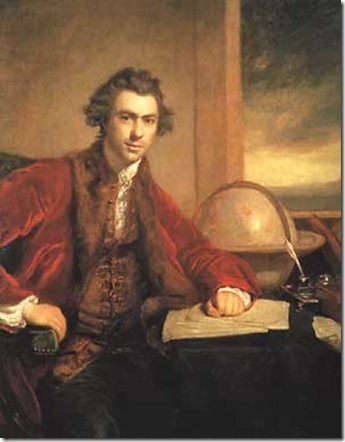I started reading The Age of Wonder: How the Romantic Generation Discovered the Beauty and Terror of Science by Richard Holmes, but because each chapter features a different historical person, I decided to review the book chapter by chapter, as I read it, and discuss the biographies separately. The Age of Wonder came out last year, getting glowing reviews. I immediately bought it, but didn’t start reading it until after I saw it on several best books lists of 2009. Chapter one starts off like gangbusters with a thrilling tale of Joseph Banks, an unknown historical figure to me, but after finishing the chapter, I wondered why he isn’t one of the more famous dudes in history.
Sir Joseph Banks (1743-1820) was a handsome Englishman that would have put Jane Austen’s Mr. Darcy’s riches to shame. Banks was wealthy enough to finance himself, and his assistants, as the botanist on James Cook’s first voyage around the world in 1768-1771, and he could be one of the many models for James Cameron’s Avatar, because Banks went totally native in Tahiti decades before Fletcher Christian, falling in love with sexual free island women, the Eden-like Tahitian culture, learning their language and ways, shocking his fellow crewmen on the Endeavor, and bringing back concepts of free love and earthly paradise to European society on his return. By exploring new ideas about morals and behavior, Banks became a proto-anthropologist. Joseph Banks became famous in a time when it was hard to become famous, when the only mass media were the newspaper and the recently invented general circulation magazine – literacy was far from universal.
Richard Holmes could have written a whole book on Joseph Banks the size of The Age of Wonder and it would have been riveting, leaving his readers begging for more. I know I wanted more, but when I went looking, the pickings were slim. Patrick O’Brian, author of the popular Jack Aubrey-Stephen Maturin sea novels, wrote Joseph Banks: A Life which I plan to buy, even though the reviews on Amazon have been less than enthusiastic. Amazon also offers Journal of the Right Hon. Sir Joseph Banks: During Captain Cook’s First Voyage in H.M.S. Endeavour in 1768-71 to Terra del Fuego, Otahite, New Zealand, Australia, the Dutch East Indies, etc, but I don’t know if I’m hard core enough to read that book yet. I really wish for a David McCullough biography of Banks, because I love reading the big predigested cerebral view of history, rather than reading contemporary journals and diaries myself. Amazon also has Sex, Botany, and Empire: The Story of Carl Linnaeus and Joseph Banks by Patricia Fara, which tempts me with the big picture, but not enough to buy yet because of limited reviews.
Banks claim to fame now, and in his own time, was more than just titillating adventure stories about getting his penis polished by South Sea babes. Banks was the Internet Entrepreneur of his day, not for being rich, but for being part of a 18th century gang of geeks ushering in the new paradigm shift of science. We think we live in exciting times because of the Internet Age, but is that really true? What blows our minds today are but spring storms compared to the mental hurricanes of the Age of Enlightenment. We debate freedom of information, they fought for personal freedoms, and dared to step away from God to discover science. We’re excited about ebooks, but they were excited about real books becoming popular with the common man and woman. We’re excited by Twitter and Facebook, but they were discovering scientific journals and the magazine. We have Google, but Joseph Banks was promoting Carl Linnaeus and the classification of plant and animal life and building a natural history database. Banks crawled the real world indexing its features.
We take too much for granted in the 21st century. And we’ve all forgotten far too much about how we got here. Few of us even have a glimmer of the real story. Reading The Age of Wonder is a voyage of discovery into the 18th century where the foundation of modern mind was created. Slowly, as I’ve gotten older, I’ve been working my way backwards in time. Growing up meant getting comfortable with the 20th century, but I’ve spent a lot of time exploring the 19th century in books, and only now at 58 am I starting to really push back into the 18th century. I routinely flit up and down the timeline of history, and even prehistory, but I seldom get comfortable in any era for anything length of time. Reading The Age of Wonder convinces me I need to make a major expedition into the 1700s.
Some websites to browse:
- Joseph Banks 1743-1820 at Plant Explorers
- The Endeavour Journal of Joseph Banks 1768-1771 (volume 1)
- The Endeavour Journal of Joseph Banks 1768-1771 (volume 2)
- The Papers of Sir Joseph Banks
JWH – 1/23/10


Let me recommend you the Baroque trilogy by Stephenson. It’s an exciting trip to the 17th century, with plenty of reflections on the origins of science and economy.
Thanks Ignacio. I’ve been waiting for an unabridged version of the book to come out on audio. There is one for his latest book, so I’m hoping the success of it will inspire audio editions for his older books.